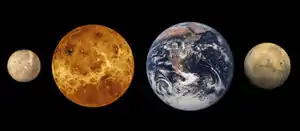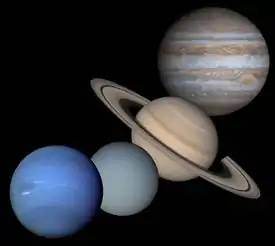Planet
A planet is a celestial body, directly orbiting a star, not sufficiently massive enough to generate photons in the range of visible light, but larger than a comet or asteroid. On both ends of the mass spectrum, it is a subjective call whether a body is a planet or not.
| It's not rocket science, it's... Astronomy |
| The Final Frontier |
| The abyss stares back |
|
v - t - e |
Planets can have atmospheres ranging from thick to none, and they can have lesser bodies orbiting them as satellites. The largest satellite (Ganymede) of the largest planet (Jupiter) is bigger than the smallest planet (Mercury). Humans have taken close-up photographs of all the planets in the Solar System with probes.
Pluto isn't a planet, however. Some people decided it, plainly and simply, sucked too much to be a legitimate planet[1]. Sorry Hades.
Rocky planets

A rocky planet, also called terrestrial planet is a planet made primarily of rock and often with metallic cores. According to theories on the development of solar systems and observations of our own, this is because heavier elements stay close to the centre of the solar system, close to the star, and form planets there. Rocky planets are one of two types of planets, the other being the Gas Giants where the atmosphere composes the majority of the planet's volume, rather than just a thin skin close to the surface. Rocky planets can also be classed as dwarf planets like Pluto when they're too small to be classed as actual planets.
In our solar system, the inner planets (Mercury, Venus, Earth and Mars) are rocky planets. The famous exoplanet Gliese 581c is also a rocky planet.
in 2006, Pluto was removed from the list of rocky planets,[2] because it is similar in size to several other objects that are generally not classified as planets, including one that is actually twenty-seven percent more massive than Pluto. Indeed there is a fine line between small rocky planets, moons and large asteroids.
Few rocky exoplanets have been discovered so far, this is most likely because their small size and mass makes them difficult to detect.
Stars with planetary systems are believed to be quite common, however, and as new detection technologies are developed, more rocky planets will almost certainly be discovered.
Gas giants

A gas giant is a large planet consisting of gases (predominantly hydrogen and helium) held together by gravitation, although many gas giants also have a solid rocky core and icy rings surrounding the equator (though aside from Saturn's impressive ring system, they tend to be rather small compared to the planet itself, which should be obvious since the image in this section doesn't show them clearly). Gas giants are one of three types of planets, the other being the rocky planets and ice giants.
Gas giants are larger and more massive, but have lower densities, than rocky planets. Clearly, being gaseous they need to be more massive in order to generate sufficient gravity to hold themselves together. Jupiter, for example, has a diameter of 142,984km[3] (12 times that of Earth) and some exoplanets are even larger than Jupiter.
Gas giants are always incapable of supporting human life partly because they lack a solid surface, and because no human being could withstand the force of their gravity. However they've a retinue of moons that are friendlier to human life (in the sense of much lower gravity and having a solid surface, that is).
In our solar system, two of the Jovian planets (Jupiter and Saturn) are gas giants.
Most exoplanets that have been discovered so far are gas giants, and also in very close orbits. This is most likely because gas giants are large and thus more easy to detect than rocky planets via their gravitational effects on their star or occlusion of its light.
Ice giants
Ice giants are large planets mainly composed not of hydrogen and helium but instead of elements as oxygen, nitrogen, or carbon as well as their compounds (read: water, methane, and the like). Two planets of this kind, Uranus and Neptune, are known to exist in our solar system with some (theoretical) evidence of a third.
Their structures are thought to be somewhat similar to the one of bona-fide gas giants, with a rocky core surrounded by a mantle of water and methane, and this finally by an atmosphere of hydrogen, helium, and some of those compounds. Like gas giants, and at least in our solar system, they have a system of rings and a number of moons.
Exoplanet searches have located many of these type of worlds, being rather usual to find them orbiting low-mass stars in close orbits. It's likely this is an observational bias and that there will be others in Uranus or Neptune-like orbits.
Smaller versions of these worlds, that may even have masses comparable to that of Earth, are known as "Mini-Neptunes" or "gas dwarfs".
Super-Earths
Super-Earths are planets with masses between Earth's one and Uranus/Neptune's one, not (known to be, as Planet IX if it existed at all could be one of this) present in our Solar System but found by the numbers in exoplanet searches. As this classification refers only to its mass, they may fall into any of the three categories of above.
Rogue Planets
If you thought that sub-brown dwarves were sad, these poor guys used to be in planetary systems, but were kicked out for various reasons, such as living in an unstable multiple-star system, a nearby star system passing by, a larger planet, living in a binary planet system, or another rogue planet (in the last two scenarios the other planet often crashes into the star). Some rare cases have a rogue planet get lucky enough to be adopted by another planetary system, but this is very rare. They can even form their own little planetary system, composed of its moons and captured interstellar comets. While a rogue planet could never support life as we know it, some gas giants may have a situation similar to Europa, where they have an icy moon with a subsurface ocean heated by geothermal vents due to gravitational forces by the planet squeezing it. Life here would be like the bottom of the ocean, having to make their own light and withstand extreme pressure and temperatures. Also, any plants in this scenario would have to feed off of chemicals at the bottom of the ocean, and intelligent life would be nearly impossible.
On your calendar
Saturn, uniquely among the gas giants, has been honored by having the seventh (or sixth, depending on your personal issues) day of the week named after him: Saturday.
The Romans also called their year-end "our calendar is screwed up again" party "Saturnalia."
See Also
- Gliese 581c
- Exobiology
- Exoplanet
External Links
References
- Or maybe it didn't suck enough since it hasn't cleared its neighborhood with its pathetic size
- See IAU definition of planet
File:Wikipedia's W.svg - Jupiter, nineplanets.org,